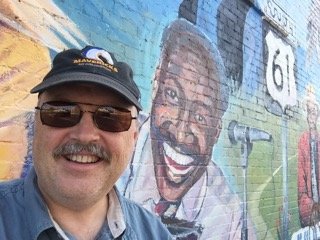The coffee shop was closed. I would not have made the detour into Leland if it hadn’t popped up on my smartphone map. And who would have expected that a coffee shop would be closed at 9 am? So there I was peering in the dusty glass, trying to conjure some sign of activity inside, sweating already on a Mississippi August morning. It didn’t look so inviting anyway.
Next door, by the package store (Cheer!), a brick facade failed to conceal the implosion beyond. One step through that door and you’d be in the middle of a rubble pile. I remembered a similar block with a similar fate back in my own corner of the South. A few months back an empty brick beauty just collapsed, threatening the stability of all the buildings around it.
I confess. It’s not just the Yelp reviews that pull me into towns like this from here to Texas. I’m possessed by a belief that I’ll find the soul of the South in the next aging town I visit – some unique locale that, in its distinctiveness, will reveal to me what this experience of life in this place is all about.
But the fronts are falling. The profiles of so many buildings that have given shape to towns for many years will soon give way. The texture of towns will change from sun-baked brick to metallic stores with “Dollar” in their names. And will Leland or Selma or Jacksboro be any less than they were for this slow, steely death?
I wandered the block, past the bright mural depicting blues greats from days gone by. Though it was the Delta, not the Virginia Piedmont, I had an intimation of home. My explorations in such places have been honed by boyhood instincts for the open door, through which I felt no compunctions about entering, welcome or not, when I was young.
In my hometown, it was all fair game after school. I knew the door that opened on to the stairs at the bottom of which was a Pepsi machine where you could put in a dime, open a small door, and twist a glass bottle of soda from an icy grip. I knew the way to the furniture store’s back room where, embraced by the humid, stagnant air, I could curl up on a plastic-wrapped mattress and steal a nap.
O these shells hold multitudes, hold storehouses of memory beneath the dust. How he embezzled that cash from the register each time the paycheck seemed too far off. How they groped each other desperately in the upstairs loft. How he drank himself drunk, each night saying it was the last, after her death. How they despaired as the fan roared in its iron cage and the sun spilled in and a boy chunked gravel down the rails outside and a man with a beat-up guitar scanned the corner for shade and a place to sit down with his hat upturned on the pavement. And somewhere down the street a choir with a gut-busting, heart-breaking soprano sang through an open church window.
It wasn’t a legacy of dissolution I sensed in Leland last summer. It was the hint of old passions still rising.
Alex Joyner is a writer and pastor on Virginia’s Eastern Shore. He is the author, most recently, of A Space for Peace in the Holy Land [Englewood, 2014].
Follow us!
Share this post with your friends.




Alex: In the ordinary, in the every day, in the world we actually know, you continue to find for us the “soul” that belongs to us all. And interestingly so. Your eyes and your words are special. Thank you. Good work. Jim
Thanks, Jim. I’ve had some good teachers in the art of seeing the world with different eyes.